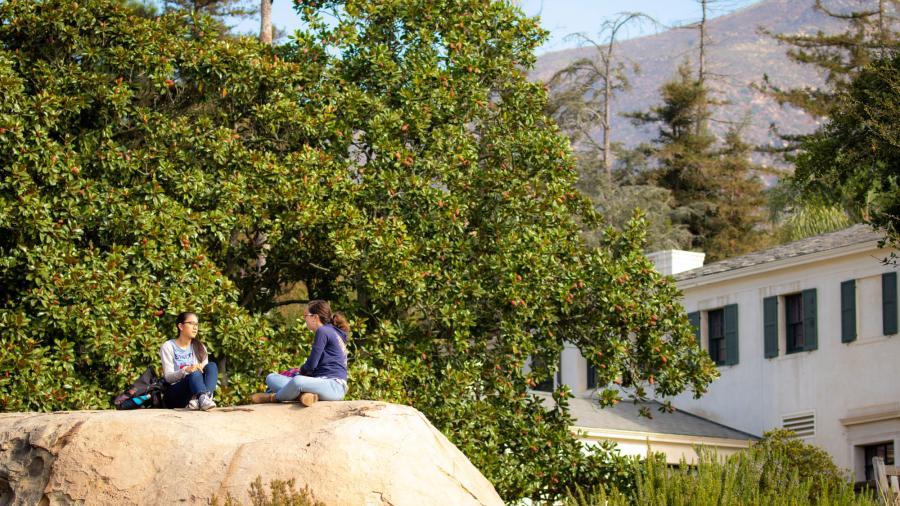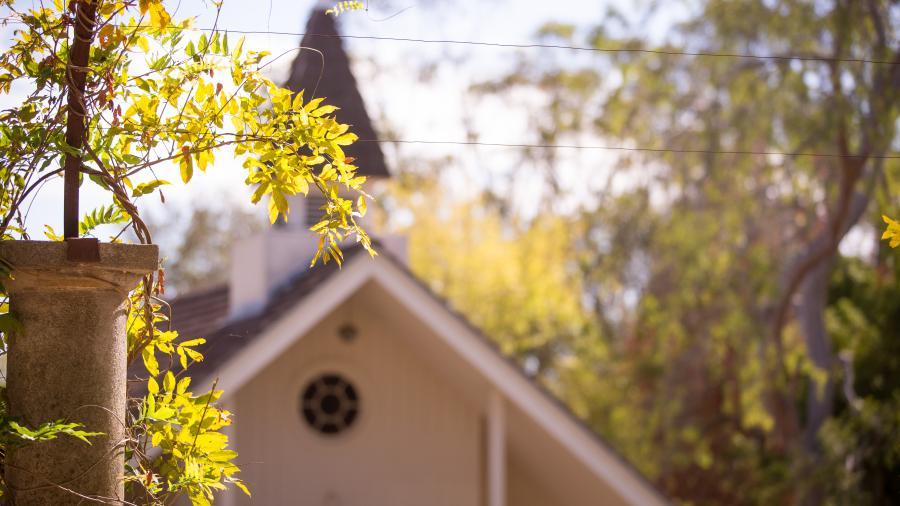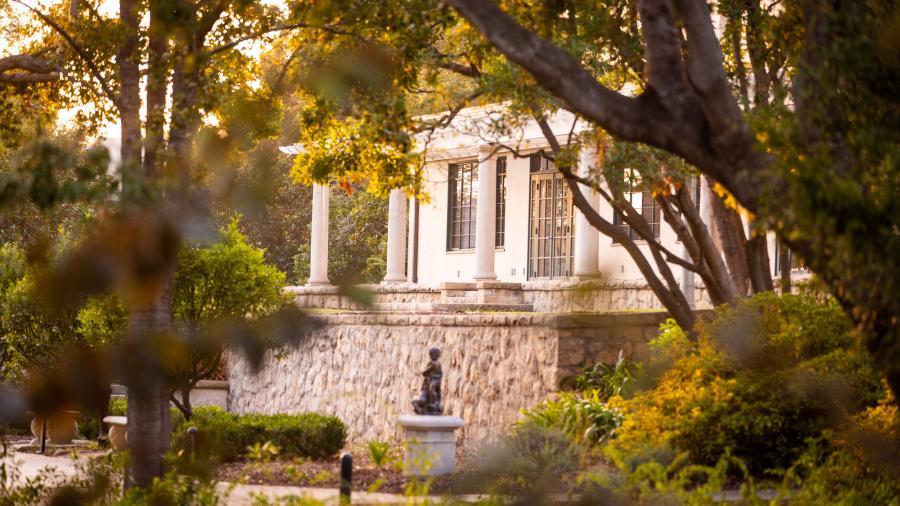The first was the Voskuyl Memorial Chapel window--and the Voskuyl Chapel that was built in honor of Nancy Voskuyl. She was 19 years old when she was killed tragically in a car crash coming back to campus after lunch in December of her freshman year (1959), and the chapel was built to honor her. There’s a wonderful history that Dr. Lisa DeBoer, the chair of our Art Department, has shared with me. My own discipline, my PhD is in philosophy of religion and theology, and historical theology, is a favorite area of work and research and so I am always interested in the design of churches on both the architecture and the interior design that go into these buildings). During the last couple of years, several conversations have come to the forefront, and we recognize that the chapel window has become a significant distraction to the primary purpose of the chapel, which is to serve as a place for prayer. We’ve engaged in several conversations. We have continued to move forward in our work on how best to address some of the concerns. Again, Dr. DeBoer and also Dr. Telford Work, our professor of theology and specifically our doctrine professor, have been helpful. We’ve also worked with outside consultants, including a consultant that designs and is approved to design churches that have been authorized by the Vatican. Together, these and other voices are helping us put together a plan that will allow us to add a variety of windows to the chapel that will more fully educate us on the life of the church and the various events from the life of Christ that are meant to inspire us.
A second priority that’s highlighted in the March 5 letter is the commitment to curricular innovations. And I think it’s significant that March 5 was a Thursday night when we released the letter, and Friday was the last day before spring break. We've never repopulated campus since then. Nevertheless, the faculty committee under Provost Sargent’s leadership, has continued to meet. One of the outcomes that we were able to announce at the May board of trustees meeting was the approval of an ethnic studies minor. Part of this is just the fact that we have come to a time when that is a high-demand topic. But it’s also reflective of the fact that we have been making several hires over the last several years that has brought to the faculty, a new level of expertise that actually makes an ethnic studies minor possible. And so, I’m delighted that we’re going to be able to do that [beginning this fall].
Questions have come up about our hiring practices: why we hire the way we do; why we haven’t done more hiring of diversity. I’m at the start of my 14th year, so I’ve been here for 14 cycles of faculty hiring. I don’t hire faculty directly, I’m involved in the process, but this is coordinated and led by the provost and then the various departments in which the faculty member will be housed. During my tenure, 58 total faculty have been hired: 35 have been women, 23 have been men, and 17 have been persons of color. In addition, and this includes my time, but certainly predates my time, we currently have on the faculty (roughly 100), 13 where their country of origin is somewhere other than the United States. You combine that quality of faculty and the curriculum of Westmont and it just makes for a very strong offering. We’re going to continue to work on diversity and global engagement, which is both a committee of the faculty as well as a committee of the board of trustees. We continue to raise a great deal of money that is providing scholarships for a variety of programs that have allowed us to diversify the student body. During my time, diversity, the diversity of the student body, has increased by 17 percent. But that has come at a significant uptick in terms of scholarships. And so none of this happens instantly. All of it happens over time, and you never solve a problem in one year. I like to think that we overestimate what we can get done in one year and underestimate what we can get done in 10. And we still have a lot of work to do, but we also have the commitments and the priorities in place to do that.
Current Resources:
I also want to mention some of the resources that are already at play that are helpful. One of my favorites to mention is the work of Dr. Carmel Saad, assistant professor of psychology. One of her research areas is implicit bias, and she teaches social psychology. She is a fan favorite of students, and certainly a great communicator. She also is consulting with five different police forces on how to eradicate prejudice from the police force and how to minimize implicit bias so that they don’t jump to conclusions. I am so thankful for Dr. Saad and specifically for the work she feels called to do to really address something that has caused so much of the key elements of our current crisis.
There are just so many other directions we could go, but on this topic, I want to highlight two others:
1. Very soon, we’ll be strengthening the staff in terms of our intercultural programs offerings, and we’ll also be adding some key advisors that can help us.
One in particular, is Carol Houston, an African-American pastor who serves on our board of trustees. She will begin working with us starting with fall semester, coming to campus to really improve our capacity for conversations that get to the heart of many of the issues that are now being raised.
2. We also intend to work with an organization headed by David Bailey called Aarabon and David, also an African American, specializes in coming into organizations and really helping them develop a capacity for cultural understanding to increase our capacity to actually work across racial boundaries and to learn how to engage in ways that actually build trust and provide healing. And so, we’re also looking for his help. This will be a two-year relationship that we enjoy with David.
Several of you have asked about the incident of the offensive posting on Instagram and TikTok, and as soon as we were made aware of it, we contacted the student and issued a response. We issued a statement from the college which is still available on Instagram, and the student issued a personal apology. There’s now a student conduct process underway, and as with every student conduct process, it’s completely confidential. If you’re concerned or interested in what are the guidelines or laws with which we have to comply, FERPA is the federal government guideline with which we have to comply. FERPA’s website will give you access to the knowledge that you might desire.
Closing and Prayer:
Let me conclude with this brief comment and a prayer. Thank you so much for your attention. We’ve been receiving a number of comments. Some have been directed at a variety of individuals here on the administration, some at the college generally, some at mid-level administrators and faculty; some recounting experiences on campus that we know about, others about experiences that we’re hearing about for the first time. I want to assure you that every time we have ever received a complaint of racial bigotry or insensitivity, we have investigated it and we have a process for investigating it. And we have always taken the action that’s appropriate for the confirming evidence we’ve obtained. There are things that I myself have read on Facebook and on Instagram that state things that have happened, that I believe to have happened, but they didn’t get reported properly. We don’t have records of them. And so, I want to be sure that as stories get shared, that we don’t create false impressions that the college is somehow negligent in investigating something of this magnitude. It’s taken very seriously.
In the 14 years I’ve been here, I inherited a wonderful Student Life team. Edee Schulze, vice president for student life, continues to lead that team and they take this very seriously. We had two incidents that have been mentioned just in the last day that there is no record of it within the ways in which we keep records, which are very scrupulous. So, I say, as a concluding comment, that this [issues of racism on campus] is a priority for us. This is not something that we take lightly and it’s part of the full extent of our responsibilities as the leadership team of the college.
It’s my hope that as we move deeper into the summer, as we continue to wrestle with the issues that have the country roiling, that we’ll be able, as a college community, to work our way through this period of challenge as followers of Christ in a way that honors Him. It is my hope that we can build a culture of integrity, care, and respect that truly makes a difference. I want us to work this way. As we watch the news and follow cultural events on social media platforms, there are important messages that are being communicated by those who are engaging in peaceful assemblies. We need to be sure that we participate in ways that reflect our core values. Each one of us needs to accept personal responsibility and personal leadership in doing what we can to eradicate prejudice, bias, and bigotry from our own life, from our community, and from our college. It’s my hope that we’ll be able to repopulate for face-to-face instruction this year, not only so we can benefit from the full orbit of our academic experience, but so that we can engage together in important conversations that reflect a commitment to honest engagement on the core values that guide this college, and, it’s my hope, will guide you for life. I think we all have a role to play, and it’s my hope that we’ll accept both our role and our responsibility to play it well.
Lord, for this time I give you thanks. For the ministry and mission of Westmont, I’m grateful, as we wrestle with challenges and a variety of responsibilities. We pray that we will find our way through it in a way that honors you and that can build a community of integrity, care, and respect. I pray for these families. I pray for these students. We look forward to welcoming them this August. In Christ I pray, amen.
God be with you.
Gayle D. Beebe
President



